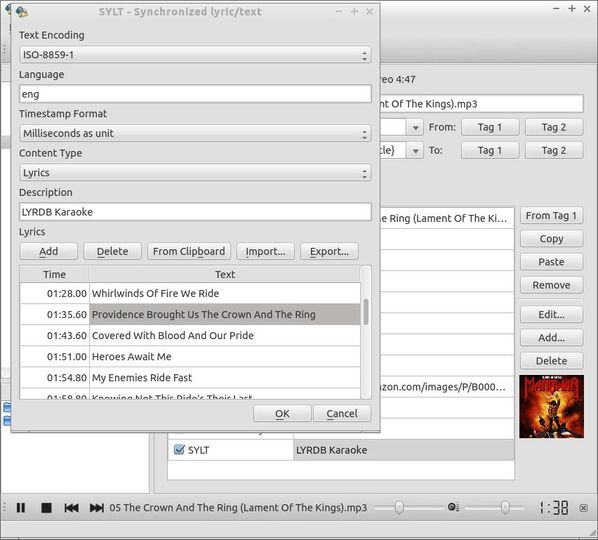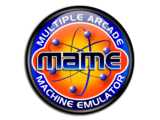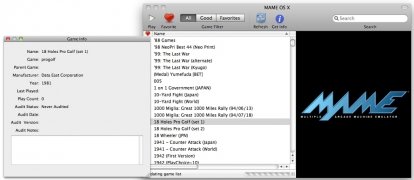
Summary: it's not an entirely a meaningful question, but to the extent that it's meaningful Mavericks is a 64-bit OS.
MAME OS X 64 BIT INSTALL
10.6, for example, would install exactly the same on a 32- or 64-bit computer, and then decide at runtime which mode each program should run in. Note that there've never been separate 32- and 64-but versions of OS X. The most visible example of this is the System Preferences, which normally runs in 64-bit mode, but can quit & relaunch itself in 32-bit mode to run old 32-bit-only preference panes (if you can still find one). But it's still fully capable of running old 32-bit programs, and there are even a number of system programs that can run in either mode (again, to provide compatibility with old 32-bit software). Starting in 10.8, Apple removed the 32-bit versions of the kernel and most built-in apps, meaning that it'll only run on 64-bit CPUs. Over the history of OS X, it's gradually morphed from 32-bit only (through 10.2 I think), to fully 32+64-bit capable (10.6), to mostly-64-bit-only (10.8-10.9). It also has a multi-architecture binary format, so a single program can include both 32- and 64-bit code, and the OS will simply run it in whatever seems to be the most appropriate mode at the moment. GPL-2.OS X doesn't really have a single overall mode - it can easily run different components (different processes, the kernel, etc) in different modes. The latest official MAME release is available on the Latest Release page.

MAME OS X 64 BIT SOFTWARE
MAME (originally an acronym of Multiple Arcade Machine Emulator) is a free and open-source emulator designed to recreate the hardware of arcade game systems in software on modern personal computers and other platforms. Its intention is to preserve gaming history by preventing vintage games from being lost or forgotten. It does this by emulating the inner workings of the emulated arcade machines the ability to actually play the games is considered "a nice side effect".
MAME OS X 64 BIT MAC
Joystiq has listed MAME as an application that every Windows and Mac gamer should have. The first public MAME release was by Nicola Salmoria on February 5, 1997. It now supports over 7,000 unique games and 10,000 actual ROM image sets, though not all of the games are playable. MESS, an emulator for many video game consoles and computer systems, based on the MAME core, was integrated into MAME in 2015. The MAME project was started by the Italian programmer Nicola Salmoria. It began as a project called Multi-Pac, intended to preserve games in the Pac-Man family, but the name was changed as more games were added to its framework.

The first MAME version was released in 1996. In April 1997, Salmoria stepped down for his national service commitments, handing stewardship of the project to fellow Italian Mirko Buffoni for half a year. In May 2003, David Haywood took over the job of project coordinator and from April 2005 to April 2011, the project was coordinated by Aaron Giles. Angelo Salese stepped in as the new coordinator. The project is supported by hundreds of developers around the world and thousands of outside contributors.Īt first, MAME was developed exclusively for MS-DOS, but was soon ported to Unix-like systems (X/MAME), Macintosh (MacMAME and later MAME OS X) and Windows (MAME32). Since, with version 0.37b15, MAME's main development has occurred on the Windows platform, and most other platforms are supported through the SDLMAME project, which was integrated into the main development source tree in 2006. MAME has also been ported to other computers, game consoles, mobile phones and PDAs, and at one point even to digital cameras. In 2012, Google ported MAME to Native Client, which allows MAME to run inside Chrome. Major releases of MAME occur approximately once a month. Windows executables in both 32-bit and 64-bit fashion are released on the official web site of the development team, along with the complete source code.
MAME OS X 64 BIT CODE
Smaller, incremental "u" (for update) releases were released weekly (until version 0.149u1) as source diffs against the most recent major version, to keep code in synchronization among developers.

The MAME source code is developed on a public GitHub repository. This allows those with the required expertise and tools to build the most up-to-date version of the code and contribute enhancements in the form of pull requests.

Historical version numbers 0.32, and 0.38 through 0.52 inclusively, do not exist the former was skipped due of similar naming of the MAME32 variant (which itself has since been renamed MAMEUI due to the move to 64-bit builds), while the latter numbers were skipped due to the numerous releases in the 0.37 beta cycle (these version numbers have since been marked next to their equivalent 0.37 beta releases in the official MAMEdev website). The architecture of MAME has been extensively improved over the years.


 0 kommentar(er)
0 kommentar(er)
